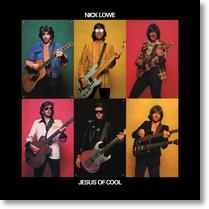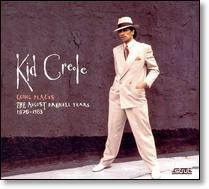A Consumer Guide to the Trailing Edge: May, 2008
Recycled Goods (#53)
by Tom Hull
 |
 |
Still in semi-retired mode: what follows is merely the records that fit that I happened to get to during the month of May -- 14 this time, about the same as 12 in April, way below the 40-50 I was knocking off up through January. That suggests a new norm, but it may just be coincidence. Incoming mail has fallen way off, but I've started to pick up some items from download sources -- not the best way, especially as it gives me no clue to packaging. The Nick Lowe is one eight such records this time, but I still have the original import vinyl (alas, no longer the Bowi EP).
Nick Lowe: Jesus of Cool (1975-78 [2008], Yep Roc): Before punk hit and new wave rolled in, there was a minor movement in Brit rock called "pub rock" which in retrospect looks like the first postmodern revival of old time rock and roll. Brinsley Schwarz, a band named for the future Graham Parker Rumour guitarist, was on the soft country end of the movement until bassist Lowe emerged as a world class pop jester, peaking with the 1974 New Favourites of Brinsley Schwarz -- never released in the US, only on CD as a BGO twofer with the sweeter Nervous on the Road. Lowe's debut didn't cross the pond intact either. The UK release was called Jesus of Cool, an unabashed reference back to the Beatles' conceit. Columbia aimed lower, calling its reshuffle Pure Pop for Now People, scrambling the cover, and tacking the lowbrow "Rollers Show" on to mitigate the highbrow tunes about castrating Castro, belittling Hitler, and devouring silent movie actress Marie Provost. Actually, the repackaging sharpened the record up a bit. The reissue is less a restoration than an expansion, picking up not just the album's spare parts but non-album one-shots, like Lowe's Bowi EP (capitalizing on David Bowie's Low album), and "I Love My Label" (generously contributed to a label sampler) -- 21 tracks in all. A
Orchestra Baobab: Made in Dakar (2007 [2008], World Circuit/Nonesuch): Afro-Cuban music preserves more Africa than any other American creole form: the authorities made little effort to wipe out traditional African religions, which in any case were constantly replenished as the slave trade continued later there than anywhere else. One result is that there are as many Afro-Cuban musics as there were source clusters for the slave trade. Another is that Cuban music flowed readily back to Africa in the early 20th century, so much so that it's hard to sort out where the innovations came from. This Senegalese band is a case in point: they make their music in Dakar, but it is connected at the hip to Havana, a bridge that could be built from either side as long as they're eager to sample the other freely. A-
Briefly Noted
Toumani Diabaté: The Mandé Variations (2008, World Circuit/Nonesuch): Mali's most famous and best traveled kora player, working solo, remarkably plumbing his string instrument for melody -- sometimes two lines -- harmonics and rhythm; may be a tour de force, or at least a complement to Bach's variations on harpsichord, but the limited options impart a certain sameyness you have to meet more than half way. B+
Disco Not Disco: Post Punk, Electro & Leftfield Dance Classics (1974-86 [2008], !K7, Strut): More like mechanistic new wave, with the obscurities outnumbering the classics -- James White's "Contort Yourself," Delta 5's "Mind Your Own Business," Material's "Don't Lose Control" -- and even those remain awkwardly gawky, well shy of the grand gestures of danceable new wave bands like New Order and Cabaret Voltaire. B+
Charlie Haden: The Best of Quartet West (1986-96 [2007], Verve): A steady-flowing sampler from five albums, catching the legendary bassist at his most sentimental, with Lawrence Marable's light touch on the drums, Alan Broadbent's luxurious piano, and Ernie Watts' crooning tenor sax -- elegantly simple, even when Broadbent's string arrangements or an out-of-place vocal sample complicate things. B+
Louis Jordan: Jivin' With Jordan (1939-51 [2002], Proper, 4CD): Small group band leader turned jukebox hero, the essential link between swing and rock and roll, and one of the funniest guys of his time; one can nitpick -- was "Jordan for President" too obscure for the British compilers? -- and he does thin out beyond about two discs, but not much here, in a massively satisfying bargain box. A
Kid Creole: Going Places: The August Darnell Years (1976-83 [2008], Strut): Darnell appears as Kid Creole on four cuts, the rest ruses like Don Armando's Second Avenue and Geechy Dan's Beachwood No. 9, his debut with Dr. Buzzard's Original Savannah Band, and production jobs for ZE Records -- their own competing anthology is called Mutant Disco. A-
Liz McComb: The Spirit of New Orleans (2001 [2008], GVE/Sunnyside): Her New Orleans album picks up some occasional horns and fancy rhythm, but the backbone is a classic gospel singer who bulls her way through four originals that fit snugly with songs as trad as "Old Man River" and "Just a Closer Walk With Thee" and "Happy Working for the Lord." A-
Mission of Burma: Signals, Calls and Marches (1980-81 [2008], Matador): Boston's answer to the first wave of Anglo postpunk art bands like Wire and the Buzzcocks, but not as good, not least because they were a miserable lot -- "That's When I Reach for My Revolver" was their catchiest rant; first EP, expanded to 8 songs on Rykodisc's 1997 reissue, now up to 10 in this "Definitive Edition" -- padded with a DVD I didn't bother with. B+
Mission of Burma: The Horrible Truth About Burma (1983 [2008], Matador): Live album of mostly new material plus Stooges and Pere Ubu covers, rushed out when the band broke up and the cupboard was bare; the sound is more mechanical, proto-industrial; leader Roger Miller damaged his hearing, and if you crank this up you can too. B-
Nigeria Special: Modern Highlife, Afro-Sounds & Nigerian Blues (1970-76 [2007], Soundway, 2CD): Scattered singles, guitar-driven highlife and/or afrobeat with the occasional funk lick; the only names I recognize are Celestine Ukwu and Sir Victor Uwaifo, second-tier stars that hardly stand out in a crowd where good vibes are consistent enough to flow and varied enough to prick your ears. A-
Orchestra Baobab: Pirates Choice (1982 [2001], World Circuit/Nonesuch): A band born in Senegal's 1970s salsa boom, developed to compete with the mbalax revolution that thrust Youssou N'Dour onto the world stage, the high point in a catalog that only started attracting attention with their comeback decades later. A
Orchestra Baobab: Specialist in All Styles (2002, World Circuit/Nonesuch): Their reunion party, 30 years after they formed, 15 years after they broke up; with help from friends, including such touchstones as Ibrahim Ferrer and Youssou N'Dour, they prove they still know how to do it all. A
Sufjan Stevens: The Avalanche: Outtakes and Extras from the Illinois Album (2005 [2006], Asthmatic Kitty): Just what it claims, the surplus so idiosyncratic and fruitful it must have seemed a shame to let the first cut stand; still, I'd rather he move on: with 2 states down out of 50, he has a long ways to go, and I'd love to hear Kansas before I die. B+
Additional Consumer News
Notes
Copyright © 2008 Tom Hull.